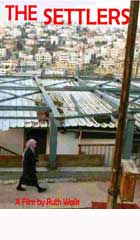
The Settlers 2002
Distributed by First Run/Icarus Films, 32 Court St., 21st Floor, Brooklyn, NY 11201; 800-876-1710
Produced by Noemi Schory and Liran Atzmor
Directed by Ruth Walk
VHS, color, 58 min.
Sr. High - Adult
Jewish Studies, Middle Eastern Studies, Political Science, Human Rights, Women's Studies
Date Entered: 08/26/2005
Reviewed by Michael A. LaMagna, Reference Librarian, Cabrini College, Radnor, PAProviding vivid images of the daily lives of three women in a Jewish settlement in a populated Palestinian city in the West Bank, The Settlers shows their determination to hold onto the land they believe was once home to Abraham, Isaac, Jacob, and King David. The Settlers begins by providing a brief but important background to the conflict between the Palestinians and Israelis over who will control land in the city of Hebron. In 1984, seven families created the settlement of Tel Rumeida on the land they believed to be biblical Hebron. Several years later, in 1994 Baruch Goldstein murdered 29 Muslims near a mosque at the Tomb of the Patriarchs. Four years later a Palestinian murdered Rabbi Shlomo Ra'anan in his bedroom and resulted in the Israeli government allowing for the permanent settlement of Tel Rumeida. The tension created by these latest two episodes and the permanent settlement is evident in the way these Jewish women speak of their Arab neighbors.
From the home of Bracha, a mother of twelve, one would not believe she lives in a militarily and politically hostile environment. However, once she and the other women leave their homes they are greeted by Israeli soldiers, military checkpoints, and insecurity. These women and the other families that compose the Tel Rumeida settlement are able to live what seems to be a normal life of political activity, family obligations, and community celebrations. It was not until the breakdown of peace talks in 2000 that a new period of violence began in the Tel Rumeida settlement and the city of Hebron. Homes were fortified with sand bags and Bracha shows where bullets have entered her home. Throughout the documentary the faith that brought these settlers to Hebron is what also keeps them there and strengthens their resolve to stay. These women believe by living in a city heavily populated by Arabs they provide a barrier against attacks on highly populated Israeli cities.
This documentary is an excellent starting point for any discussion related to the Palestinian-Israeli conflict and can be useful in political science, religious studies, history, psychology, and social justice courses. The director allows the three women to tell their story throughout the documentary; however, the English subtitles are washed-out by the background making it difficult to understand what is being said. Highly recommended, this film is a compelling look into the daily lives of Jewish settlers; it will make a great addition to any public or academic library collection.
Awards:
- Best Director, 2002 DocAviv Film Festival (Israel)